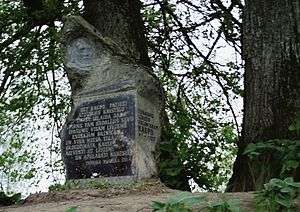Caupo of Turaida

Caupo of Turaida, or Kaupo (died September 21, 1217) was a leader of the Finnic-speaking Livonian people in the beginning of the 13th century, in what is now part of Latvia and Estonia. He is sometimes called 'King of Livonia', Chronicle of Henry of Livonia calls him quasi rex, 'like a king'.
He was the first prominent Livonian to be christened. He was probably baptized around 1191 by a priest called Theoderic. He became an ardent Christian and friend of Albert of Buxhoeveden, Bishop of Riga, who took him 1203-1204 all the way to Rome and introduced him to Pope Innocent III. The Pope was impressed by the converted pagan chief and presented him a Bible. When he returned from travel, his tribe rebelled against him and Caupo helped to conquer and destroy his own former Castle of Turaida in 1212. The castle was rebuilt two years later as a stone castle that is well preserved even today.
Caupo participated in a crusader raid against the still pagan Estonians and was killed in the Battle of St. Matthew's Day in 1217 against the troops of the Estonian leader Lembitu of Lehola. He did not have any male heirs as his son Bertold had been killed 1210 in the Battle of Ümera against Estonians. He left his inheritance to the church, but the Lieven family later claimed female-line descent from him.
Modern Estonians, Latvians, and the remaining few Livonians do not have consensus view about the historical role of Caupo. Some consider him traitor and enemy agent. Others consider him a visionary leader who wanted his people to be part of Christian and European culture. Both these judgments attribute 19th-century views about nationality to a medieval chieftain. Latvian legends, however, are unequivocal: there he is named "Kaupo the accursed, the scourge of the Livs,... Kaupo who has sold his soul to the foreign bishops."[1]
References
- ↑ Urch, R.O.G. Latvia—Country and People. London: George Allen and Unwin Ltd. 1938.